PRESERVING A MILITARY LEGACY FOR FUTURE GENERATIONS
The following Reflections represents Sgt Thomas Hewell’s legacy of his military service from 1972 to 1976. If you are a Veteran, consider preserving a record of your own military service, including your memories and photographs, on Togetherweserved.com (TWS), the leading archive of living military history. The following Service Reflections is an easy-to-complete self-interview, located on your TWS Military Service Page, which enables you to remember key people and events from your military service and the impact they made on your life. Start recording your own Military Memories HERE.
Please describe who or what influenced your decision to join the Air Force.

In June of 1971, I graduated from Oconee County High School, and a friend of mine helped me get a job as a Laboratory Technician in Plant Pathology and Genetics at the University of Georgia starting in July of that year. It sounded like a neat job at first, but after a few months of looking through a microscope in a small room, I quickly realized that was not what I wanted to do long-term. I had always thought about serving in the military because of the men in my family who had served in the different military branches and some friends of mine from High School who had immediately enlisted right after graduation. The Vietnam War was on the news constantly, and I just felt the need to serve. Although the draft was still in place, my draft number was 340, so I probably would never have been drafted, but I wanted to do my part to serve my country.
My father had served in the U.S. Navy aboard the USS Nashville as a Gunner’s Mate Third Class during с stationed in the Pacific, and I might have followed in his footsteps, but unfortunately, I get seasick. My brother had served in the U.S. Air Force as a Titan II Missile Electrical Specialist at Davis Monthan Air Force Base in Arizona, and our family had once visited him there. I was very impressed with his job of helping to keep the nation secure during the Cold War. I decided the Air Force was the right fit for me but had seen that my brother was unable to use his skills as a missile electrical specialist on the outside, so I went a different route.
I had been a Volunteer Fireman in my home county for a couple of years. I loved it, so when I went and talked to the recruiter, I found out I would be able to enlist under the Delayed Enlistment Program with a guarantee of being a Fire Protection Specialist in the Air Force. I figured I could use that training and experience to get on with the Athens Fire Department in nearby Athens, Georgia if I did not make the Air Force a career. I had actually signed up in November of 1971 and ended up enlisting with a friend of mine from High School under the buddy program. I took the oath on April 26, 1972, and boarded a plane from Atlanta to Lackland Air Force Base for basic training. I was excited but apprehensive as to what lay ahead and just made up my mind that I would do the best that I could, and I have never regretted my decision!
Whether you were in the service for several years or as a career, please describe the direction or path you took. What was your reason for leaving?

Before I enlisted in the US Air Force in April of 1972, I had been a Volunteer Fireman in my home county. I loved fire fighting, operating the equipment, serving the citizens, and the camaraderie of my fellow firefighters, so I felt like this was something I wanted to pursue when I got out of the Air Force if I decided not to make it a career. In the fall of 1972, I was talking with an Air Force recruiter, and I found out I could join under the Delayed Enlistment Program in the guaranteed field of Fire Protection. I figured I could use that training and experience to become employed with the nearby Athens Fire Dept. and make a career out of something I really enjoyed. My older brother had been an Electrical Missile Specialist in the Air Force, but that kind of training and experience did not help him search for a job when he left the Air Force. I did not realize it then, but the Lord was leading me in the direction I needed to go for several reasons that would become apparent later.
I boarded a plane in Atlanta on April 26, 1972, bound for Lackland Air Force Base in Texas. I would begin my Basic Training in Squadron 3711 and Flight 0447 with a friend from High School under the Buddy Program and other recruits from all over the country. Although basic training may not have been as arduous as other branches of service, it still taught me discipline, to be physically fit, and to work as a team with others from all walks of life. After completing basic training in June, I was sent to Chanute Air Force Base in Illinois to begin Fire Protection Specialist Training conducted by the 3345 Technical School. After completing the 240-hour course in July of 1972, I was actually assigned to Eglin Air Force Base in Florida. I had no idea getting an assignment to another base was even an option. My father had been diagnosed with Lung Cancer in 1971 while I was still in High School and had done pretty good for about a year or so, but then the cancer came back, so he was going through Cobalt Treatments in Atlanta. I didn’t find all this out until I had already enlisted. Another airman who had gone through Fire Protection Training with me was assigned to Myrtle Beach Air Force Base in South Carolina. We talked about my family situation and the fact that Myrtle Beach Air Force Base would be closer to my home, and he had family in Florida. After discussing it with our superiors, they allowed us to swap bases because we had the same job title, enabling us to be closer to our families back home, especially my father. It would have been so easy for them to have denied my request and stuck to orders, but evidently, there was empathy for my predicament, and they approved my request. I will be forever grateful! Little did I know what a blessing that would be!
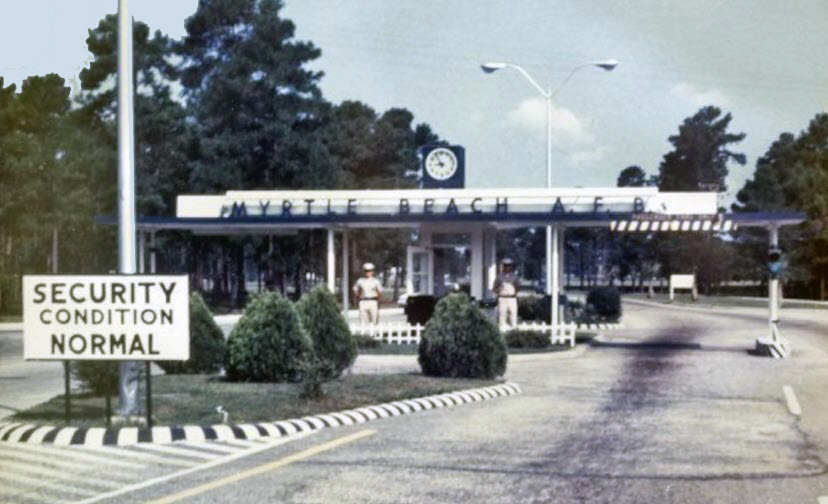
After a brief time of leave at home with my family, I reported for duty at Myrtle Beach Air Force Base in August of 1972. I quickly began getting on-the-job training in my duties and responsibilities as a Crash/Rescue and Structural Firefighter in the base Fire Department. I thoroughly enjoyed standing by on the flight line while the A-7D Corsair IIs took off on training flights and landed. We had to be ready in case of an emergency, and I was also responding to structural calls in the middle of the night for calls on the base. I did go to Chanute Air Force Base two more times during my four years of service, once for training on a new P-4 Firefighting truck and for a Firefighter Rescueman Course, but I served my entire four years of service stationed at Myrtle Beach Air Force Base. I always tell friends, “I had a rough duty.” We worked 24-hour on and 24-hour off shifts, but once a month, we would get a “Kelly Day,” which was an additional day off that would give us three days off, and many times, I would drive home to see my family since my father was sick and go with him to his Cobalt Treatments in Atlanta.
I didn’t realize how sick he was! After I had been at the base for about seven months, a friend who worked with me in the fire department and lived off base invited me to his house one evening for supper with him, his wife, and the young girl who lived next door. That was February 17, 1973! Just a few weeks later, we discussed getting married, and on November 17, 1973, we were married in my hometown of Watkinsville, Georgia. On the evening of May 13, just a few months after meeting my soon-to-be wife, I got a call about 11:00 one night from my uncle telling me if I wanted to see my father alive one last time, I better get home as soon as possible. After getting emergency leave quickly approved, I drove home during the night and got to see my father in the hospital the following day before he passed away that afternoon. The first time my fiance met my family was at my father’s funeral a few days later. My father passed away at the age of 50, and it was a very difficult time. I probably could have gotten out of the Air Force, and I briefly considered a hardship discharge, but since my older brother said he would help take care of my mother and six-year-old sister, I decided to stay in the Air Force. However, I decided then that when my four years were up in 1976, I would leave the Air Force and return home to be close to my mother. We had bought some property right next to my mother’s land, so when I left the Air Force on April 26, 1976, we moved back to Georgia and built a house next to her. I was there to help her and my sister until my mother’s passing in 2008. I will always be extremely grateful and proud of my service in the US Air Force for all I accomplished and the experience it gave me when I returned to civilian life!
If you participated in any military operations, including combat, humanitarian and peacekeeping operations, please describe those which made a lasting impact on you and, if life-changing, in what way?

I will be forever grateful to those men and women who have served in combat during all the many conflicts to protect and defend the United States of America, but I am still very proud of my service. I spent my entire four years in the U. S. Air Force stateside at Myrtle Beach Air Force Base, so this did not present me many opportunities to become involved in too many other operations, either military or humanitarian. But there was one distinct incident that we were engaged in that definitely impacted my life and career after the service. A couple of months before I was scheduled to complete my enlistment in the Air Force, there were several weeks with very little rainfall, high temperatures, and low humidity, which led to an increase in the number of wildfires surrounding the Myrtle Beach, South Carolina area. The civilian fire departments were overwhelmed and asked the base for mutual assistance fighting the fires. Base Fire Department personnel were dispatched to many grass and wood fires to provide as much help as possible. I can remember it like it was yesterday! We were helping on a pretty large wildfire by pulling water hoses to wet down the vegetation and using hand tools to stop the spread. I was standing by one of my fellow airmen firefighters when we heard the sound of heavy equipment. About that time, a South Carolina State Forestry bulldozer came pushing through the trees and smoke, plowing a firebreak along the burning edge of the fire and passing right in front of us. I was so impressed with the job he was doing in stopping the wildfire, and I turned to my friend and said, “When I get out in a few months, that looks like something I would like to do.” I had no idea how prophetic that would be!
We worked for several more weeks off base, providing assistance until all the wildfires were brought under control. I hadn’t really given it another thought. I thought about my plans of moving back to Georgia, living close to my mother and sister, and starting a career as a fireman with the Athens Fire Dept. After my honorable discharge on April 26, 1976, we moved back to Georgia. A few days after we had settled, I was sitting at my mother’s kitchen table, and we were discussing my plans when she showed me a job advertisement in the local hometown paper for a Forest Patrolman position with the Georgia Forestry Commission. I didn’t really know a lot about it, but I went and talked with the Chief Ranger, J.L. Stanford, and the District Forester, Theron Devereaux. They explained that the duties and responsibilities would include operating a Forestry Bulldozer to plow firebreaks around wildfires in my home county of Oconee and neighboring Clarke County. Imagine that, if I got the job, I would be operating the same kind of equipment I had seen on that wildfire near Myrtle Beach. After completing the job application, which had all my training and experience as a Fire Protection Specialist in the Air Force, I turned in the paperwork and waited nervously to hear from them. About a week later, they called me and said I didn’t receive a high enough score. They asked me to return and wanted to know if I had put down everything I had done in the Air Force. After reviewing my records, we realized I had left out some critical aspects of my training and experience, and with their help, we submitted another application. A few days later, they called and said my score had improved dramatically enough to qualify me for the job. Just a couple of months later, in the middle of July, I began my career. I worked for eight years as a Forest Patrolman and then was promoted to Chief Ranger of the Clarke-Oconee Forestry Unit.

After serving eight years in that capacity, I was promoted to District Ranger of the 14 county Athens District and served in that capacity for about another 12 years until my retirement in 2004 at the age of 51 with 34 years of service. Although I had only worked 28 years with the Forestry Commission, I was able to purchase my nine months with the University of Georgia, the three years of military service during the Vietnam War, and two years of forfeited leave, which gave me my 34 years of service with the state. During my career with the Georgia Forestry Commission, I fought fires all across the state of Georgia. I had assignments in Florida, Idaho, California, and Wyoming, as well as other positions on other Incidents and natural disasters across the state. In 1995, I went through the Police Academy in Athens, Georgia, and became a Certified Peace Officer as part of becoming a Wildfire Arson Investigator with the Georgia Forestry Commission. I coordinated all the Fire Protection, Training, Inspections, Air Patrol, and Dispatching within the 14 counties and numerous other duties and responsibilities. I also worked in security during the 1996 Olympics and the National G-8 Conference. I am convinced that all of the discipline, training, and experience I received in the United States Air Force prepared me for my Forestry Firefighting Career. But I am also convinced that the Lord Almighty had a plan for my life all along that I thought was just luck and coincidence until I realized the truth!
Of all your duty stations or assignments, which one do you have fondest memories of and why? Which was your least favorite?

During my four years of service, I only had three bases as a duty station or assignment, and they were all stateside. The first being, of course, was Lackland Air Force Base in Texas, where I received my basic training. It started me off exactly as I expected by getting me in better physical shape, taught me discipline, taught me how to be a good team player and work with other individuals from all across the country and all walks of life, and gave me a sense of independence. It certainly wasn’t as physically demanding as some of the other military branches, but I am grateful for the experience. When I left Lackland, I went directly to Chanute Air Force Base in Illinois for Fire Protection Specialist Training. It was near the village of Rantoul and close to the big city of Champaign, Illinois. I graduated from the 240-hour course with Honors on August 1, 1972. As mentioned earlier, I was initially assigned to Eglin Air Force Base in Florida. Still, divine intervention and hardships at home allowed me to swap bases with a fellow graduate, and I was assigned to Myrtle Beach Air Force Base in South Carolina.
In September of 1973, I was one of only two airmen in the Fire Dept. to be selected to attend a 70-hour training course on a new type P-4 Crash Fire Truck at Chanute Air Force Base and then come back and teach the other firemen in the department how to operate the truck when it arrived. It was one heck of a Fire Truck that was fast and capable of foaming a runway quickly in the event of an aircraft emergency landing. Then, in May of 1974, I was selected to attend a 148-hour training Firefighter Rescueman Course that was also held at Chanute Air Force Base in Illinois. This training involved all types of emergencies, principles of rescue, first aid for all kinds of life-threatening emergencies, rescue tools, and structural construction and aircraft systems you would face in emergencies. The training involved a lot of classroom, practical demonstrations, and simulated incidents you might encounter. Since this training took a few months, I was allowed to take my wife and young son with me, and we rented an apartment nearby in Rantoul. It was nice to have my family with me, but the training was intense and didn’t give me a lot of free time to enjoy with them.
Of those three bases, I was stationed at Myrtle Beach Air Force Base for almost four years. Myrtle Beach was a huge tourist destination, and the Air Force Base was the main thing that helped support the community during the winter months. Of course, when I first arrived at the base, I was single and lived in the barracks on base, and since my father was battling cancer, I spent a lot of time traveling back home to see him and the rest of the family. Several civilian firefighters worked with us airmen in the fire department; one of them was a friend of mine named Ken Klein. He invited me to his house for supper with him and his wife one evening. They would have their next-door neighbor over as well, so it would be a blind date. On February 17, 1973, I met my future wife for the first time. We were married nine months later on November 17, 1973; this year, in 2023, we will celebrate 50 years of marriage. Our greatest accomplishment besides our marriage has been raising four sons, and we have been rewarded with one granddaughter and five grandsons. We have been very blessed, so obviously, Myrtle Beach Air Force Base will always have a special place in my heart!
From your entire military service, describe any memories you still reflect back on to this day.

My first recollection is Basic Training. I was 18 years old and unsure of what lay ahead, but I was excited to begin my service in the Air Force. I boarded a bus in Athens to go to the Airport in Atlanta, Georgia, and very soon after arriving at Lackland Air Force Base in Texas in the middle of the night, one of the first things they had me do was to shave off my long sideburns, called “mutton chops.” A few hours later, they shaved off the rest of my hair, and then we were assigned our flight class. After that, it’s pretty much a blur, except the only thing I do remember is that for the next couple of days until we received our uniforms, we were called “rainbows” because we still wore our civilian clothes, which were all colors. I do remember my drill sergeant was named “Sherman,” as in the tank. He was tough but fair-minded. I had joined the Air Force under the buddy system with a guy I graduated High School with named Mark Johnson. We were standing in line to get our shots, one in each arm, and he was behind me when I felt him leaning on my back. He had fainted, waiting to get the shots! Although Basic Training wasn’t physically as demanding as some of the other military branches, it still helped me become better disciplined and in better shape.
I don’t remember much about Fire Protection Specialist Training at Chanute Air Force Base except that it required a great deal of classroom instruction and hands-on training in operating fire trucks, spraying foam on mock airplane crashes, and going into the smokehouse with breathing apparatus. It was good training, and I was proud to be an Honor Graduate from the school. When we completed the training, we received our orders for base assignment. I was initially assigned to Eglin Air Force Base in Florida. Another guy in my class was assigned to Myrtle Beach Air Force Base in South Carolina. My father was going through cancer treatments in Georgia, so during the course of a discussion about our family situations, they allowed us to swap bases since we had the same jobs. I went to Myrtle Beach Air Force Base, where just a few months later, I met my wife through a friend on the base, and we had just celebrated 50 years of marriage. I am convinced beyond a shadow of a doubt that there was divine intervention by the Lord to bring me there for that very reason!
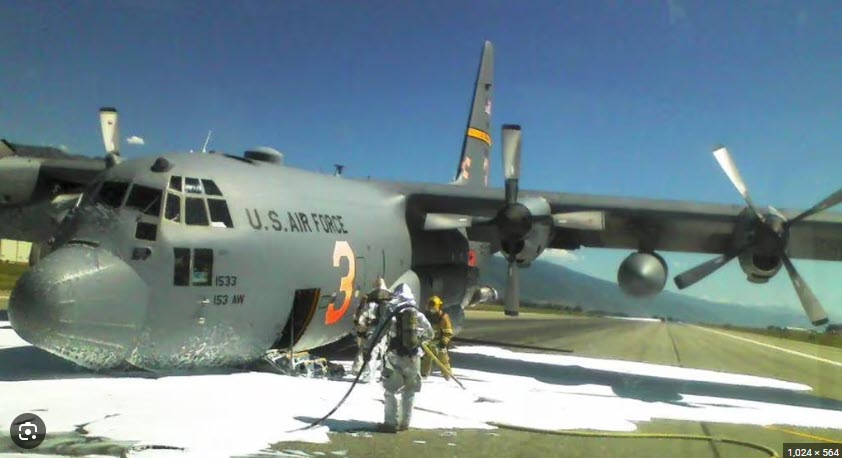
I can recall several incidents while stationed at Myrtle Beach Air Force Base for four years. Although I was not on duty that night, thirteen men died on December 5, 1972, when an F-102 interceptor based out of McEntire Air National Guard near Columbia collided in mid-air with a C-130 transport plane out of Pope Air Force Base in North Carolina. The accident occurred on a night combat profile mission, which was a secret, highly classified endeavor. Fellow firemen who responded initially talked about the devastation of the crash site, and it was something that had a great impact on the ones who responded. We had several incidents where aircraft could not get their landing gear down, so we had to foam the runway. They skidded down the runway with sparks flying, but there was no fire because the foam prevented an explosion. Myrtle Beach Air Force Base was located in one of the top tourist destinations in the country because of its beaches. One night, we received a call that the Ferris Wheel in the amusement park on the strip had collapsed. I was on the Rescue Truck that night, and the traffic was a nightmare trying to get to the park. When we finally arrived, we found out that the Ferris Wheel had not collapsed, but two of the chairs on the chair lift, which carried people over the crowds, had fallen to the ground below, and several people were critically hurt. I remember being on standby on the runway several times when the Thunderbirds, the Air Force’s top pilots, put on a demonstration for spectators. One of the performances involved 4 T-38 Talon aircraft flying in low over the runway extremely close, and the two outside planes would roll out from the other aircraft and fly straight up. After they landed, it was discovered that the wing tip on one of the planes had cut a gash in the side of the other plane, narrowly averting a catastrophe. Another neat memory is watching a Harrier Jet landing and taking off vertically instead of going down the runway. That was the first time I had seen something like that, and I was very impressed. I loved seeing all the different aircraft types, like the F-4 Phantom, the Apache Helicopter, and the C5-A, where you could get up close and personal on the flight line. The happiest memory I have is the time I was invited to a friend’s house for supper and a blind date (well, I actually found out where she worked and went and checked her out) to meet the girl who would become my wife. We met in February of 1973 and got married the following November. But the saddest part was when I received a phone call at about 11:00 one night from my uncle, who told me that if I wanted to see my father alive one last time, I needed to get home immediately. After receiving emergency leave, I drove all night and saw my father in the hospital before he passed away that afternoon. My future wife met my family for the first time at my father’s funeral service. I have so many other memories of my time in the US Air Force, and I am so thankful for being able to serve my country.
What professional achievements are you most proud of from your military career?
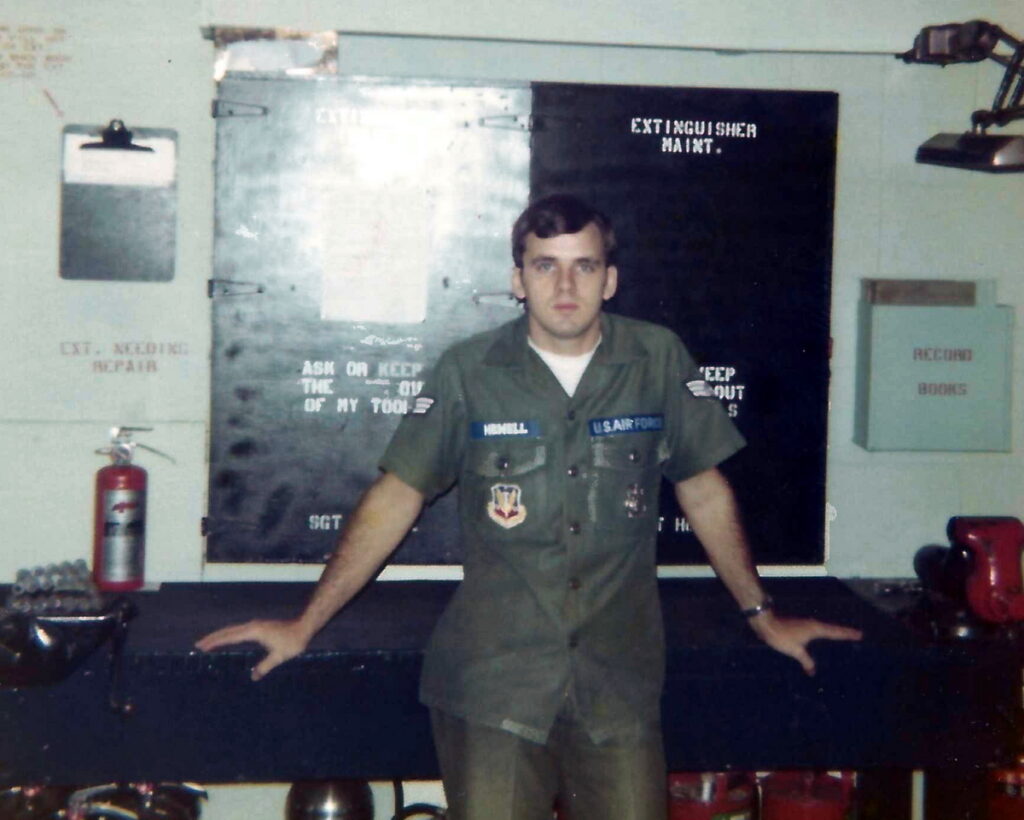
One of my first achievements was being an Honor Graduate of the 240-hour Fire Protection Specialist Course at Chanute Air Force Base in August 1972. There was a tremendous amount of classroom study and many hands-on simulated training exercises in Crash and Structural Fire Suppression, different types of fire truck operation, live fire exercises of mock airplane crashes, and burning building exercises. The following achievement was being promoted to the rank of Sgt. on July 1, 1974. I was given the rank of Airman during basic training in June 1972 and then promoted to Airman First Class on February 9, 1973. Having attained at least the rank of Sergeant before my four-year enlistment period was over was a personal goal I was proud to have achieved. Another of my professional achievements was when I was one of 4 airmen selected on September 30, 1974, to represent the 354th Civil Engineering Squadron on Honor Guard Details. I participated in Command Change ceremonies, Color Guard units in Parades, Color Guard units at Charity Fund fundraising functions, and Honor Guard details at Funeral Services for military veterans.
I was incredibly proud to be part of such an elite group of men and women who trained regularly to ensure we represented the US Air Force in a disciplined and dignified manner at all functions. Little did I know that I would one day be working as an Assistant Funeral Home Director and would be helping conduct funeral services for military veterans and watch Honor Guards from all military branches carry out these same functions for grieving families. I still get choked up when I hear the Taps being played and watch the folding of the American Flag! And finally, I guess one of my best achievements was when I was put in charge of the Base Fire Extinguisher Shop in early 1975. After the previous Shop Supervisor left for assignment on another base, I was approached by the Fire Department Chief. I was selected out of all the firemen to take over that department. I had been working a 24 hour on 24-hour off shift as a crash/structural firefighter for almost three years, and since I was now married and had children at home, I knew it would give me more time at home since I would now be working 8 – 5 Monday through Friday. I was responsible for inspecting, maintaining, charging, and proper placement of all flight line fire extinguishers, base building extinguishers, and base housing extinguishers. It was a big responsibility to ensure that if a Fire Extinguisher were needed in an emergency on the flight line or elsewhere, it would operate properly. I worked with some very dangerous chemicals, such as Chlorobromomethane, commonly referred to as CB, so I had to get regular physicals to make sure these weren’t having an effect on some of my internal organs. This also required me to make regular inspections of all extinguishers all over the base. No one else was helping me, so I took great pride in running an efficient shop. These achievements may seem minor in the big scheme of things, but I am proud of all my accomplishments during my four years in the Air Force.
Of all the medals, awards, formal presentations and qualification badges you received, or other memorabilia, which one is the most meaningful to you and why?
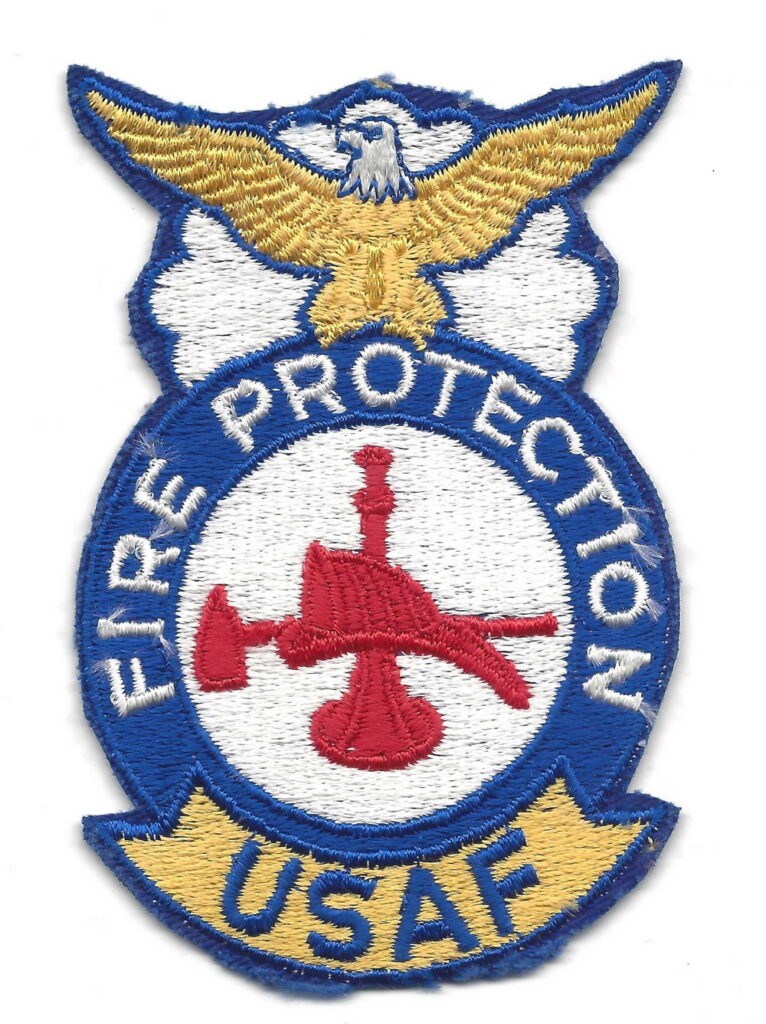
The first badge I received, and the one I was the most proud of, was the Fire Protection Specialist badge and patch. This was a 240-hour course that I completed as an Honor Graduate, which was earned by completing considerable classroom studies, practical exercises involving various fire suppression equipment, and mock emergency situations of aircraft and structures. It was what I set out to accomplish, and I was very proud to be part of such an elite group of emergency personnel. Although they didn’t come with badges, I was very proud of completing a course on a new piece of firefighting equipment, the P-4 Crash Fire Suppression truck, and also the Firefighter Rescueman Course, which were both taught at Chanute Air Force Base in Illinois.
Which individual(s) from your time in the military stand out as having the most positive impact on you and why?

The one person who had the most positive impact on my life in the military was Ken Klein. If I remember correctly, he was not actually in the Air Force but was one of several civilians working alongside enlisted men in the base fire department with me. We had become pretty good friends, and he knew I was not married, so one day, he invited me to his house for supper one evening with his wife and their next-door neighbor, a divorced young lady with a 1-year-old little boy. Little did I know that God was using Ken and his wife, Diane, to help facilitate bringing my future wife, Junie, and me together. We had a great supper, went back to Junie’s house so she could put her son to bed, and then we played the game Yahtzee and had dessert. After Ken and Diane returned home, I stayed until very late, talking with her, getting to know each other better, and finding out about our families. That was February 17, 1973. We got married nine months later, and after four sons, five grandsons, and one granddaughter, we just celebrated 50 years of marriage on November 17, 2023! God has been so good! The only other person that really sticks out was a fellow airman named Billy Jordan. We were very good friends and did a lot of things together. When Ken Klein invited me to his house for supper, knowing it was a blind date, I decided to take matters into my own hands. I found out where Junie worked, which was a KFC restaurant, and Billy Jordan and I went there to check out my future date. She and her sister were behind the counter, and after we ordered our food, Junie slid it over to me without hardly ever looking my way. I didn’t tell her until much later what I had done! It wasn’t too long after that that Billy got reassigned to a base in Japan, and I heard later that he actually saved the lives of two men. They were working inside some type of water tower and were overcome with deadly fumes, so Billy put on his breathing apparatus, climbed down inside, and brought the men back out. I wish I had been able to talk with him after that and after we got out of the Air Force, but unfortunately, we lost touch.
Can you recount a particular incident from your service, which may or may not have been funny at the time, but still makes you laugh?
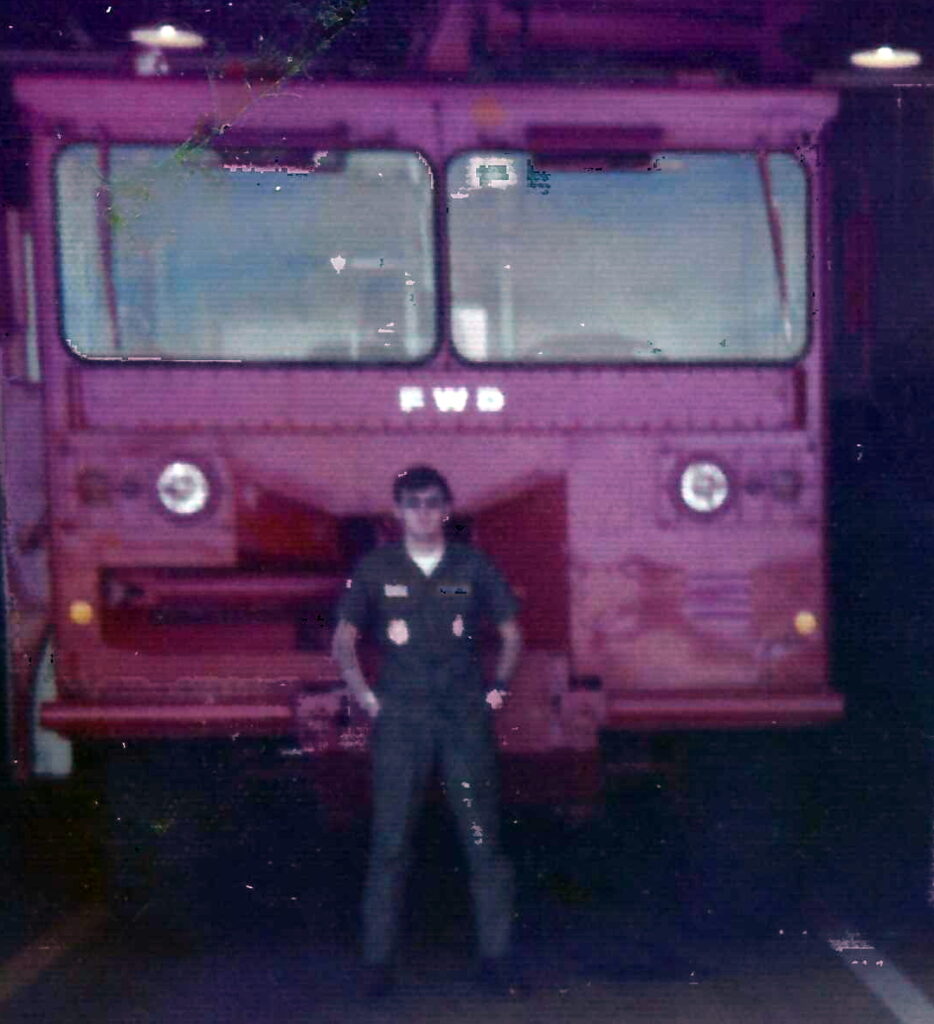
I don’t remember the year (and after I explain exactly what happened, it may be evident why I don’t know), but we were having a Base Exercise. This included simulated flight line emergencies and responses from the Fire Department, Security Personnel, Hospital Personnel, and various other units. I’m not sure exactly what was going on at the time out on the flight line, but I was standing out front of the base fire department trying to see what was happening so I would be ready to respond with the rescue truck or firetruck I was assigned at the time. Our fire department faced the flight line, and it had about five bay doors with different pieces of firefighting equipment and vehicles behind each door. I don’t know why, except it was summertime and very hot, but we had the bay doors down only halfway. I guess this was to keep the sun from shining in on the equipment and getting it hot but having them halfway open to get them up quicker when an alarm sounded. Well, about that time, the alarm did sound for us to proceed to our assigned vehicles, and I ran toward one of the bays with the door about halfway down and ducked under the door. As it happened, I picked up the one door where our water tanker was parked, and it came right up to the door. When I ducked underneath at a very fast pace, my head hit that tanker (it didn’t move, of course), and I vaguely remember spinning around and falling to the floor. I must have blacked out temporarily, but when I came to, others had seen what had happened and ran to my aid. Seeing the large bump on my head and the fact that I was disoriented, they called for an ambulance, which happened to be setting right out on the runway, and they came and picked me up. They checked me out in the ambulance and determined I might have suffered a slight concussion, so they kept me under observation until they felt it was OK for me to return to my duty station. I guess I helped the medical personnel with a real-life situation, not just an exercise. As I said, I don’t have a good recollection of many of the details, but one thing is for sure: I will never be in a hurry to duck under a door again because something may be heavy on the other side and will not move!
What profession did you follow after your military service, and what are you doing now? If you are currently serving, what is your present occupational specialty?
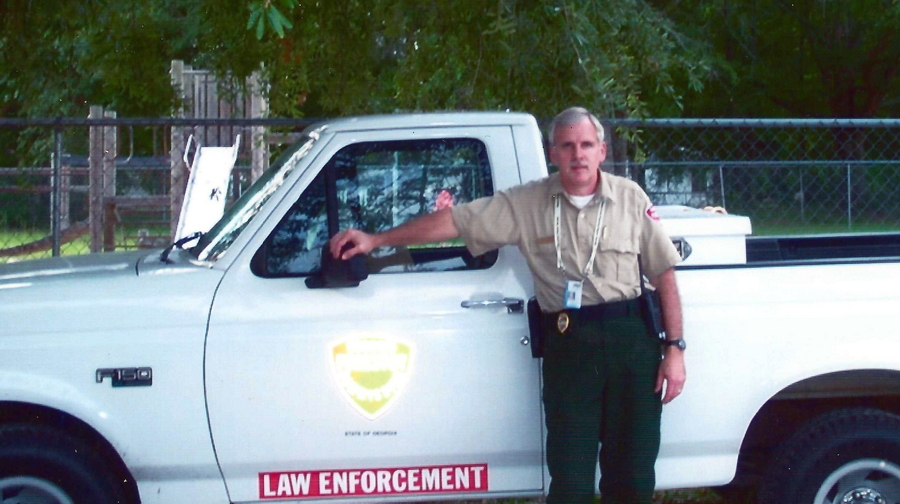
When I enlisted in the Air Force, I wasn’t sure if I would make it a career or not, so I wanted to be able to use the training and experience I gained in the service to help me obtain a job in case I did not re-enlist. I had been a volunteer fireman in my home county and really enjoyed everything about firefighting, the equipment, and the camaraderie of it, so I thought my goal would be to work in a large fire department in the adjoining county. I talked with my recruiter, who said I could enlist under the delayed enlistment program with a guarantee of being a Fire Protection Specialist in the Air Force. I applied myself to do the best I could and took advantage of any training that would not only help me during my four years of service but also help me when I got out. After my father passed away in 1973 and I got married, I knew I would be leaving after my four years and would return home to live close to my mother and baby sister so I would be of help to them and could also raise my family in a good setting. A few months before I was scheduled to be discharged, the Myrtle Beach, South Carolina, area was hit with a drought and numerous wildfires. The base fire department helped with mutual aid in suppressing these fires. While working on a fire in the middle of the woods, I heard a noise, and a Forestry bulldozer came right in front of me, plowing a firebreak to stop the spread of the wildfire. I told my friend next to me that that looked like something I would like to do one day. When I left the Air Force in April of 1976, my mother showed me an advertisement for a Forest Patrolman with the Georgia Forestry Commission. I went and interviewed, and thanks to all the training and experience I received in the Air Force, I was hired in July of 1976. I worked as a Forest Patrolman in the Clarke-Oconee Forestry Unit, and my duties were to operate heavy equipment (just like the bulldozer I had seen plowing the firebreak) in the suppression of grass and woods fires, as well as many other responsibilities.

After eight years, I was promoted to Chief Ranger of that unit, supervising several other employees in suppressing wildfires. After eight years in that role, I was promoted to District Ranger of the 14 county Athens District of the Georgia Forestry Commission. I was responsible for coordinating all the fire control, air patrol, dispatching, training, inspections, and supervision of about 40 employees in the surrounding county units. In 1995, I went through the Northeast Georgia Police Academy to become a Certified Peace Officer and one of 12 Wildfire Arson Investigators in the state. Through many days and hours of training, I was certified in all of the Incident Command System positions. I became an instructor traveling all over the state of Georgia, training other Forestry personnel as well as fire department personnel. During my career, I assisted with large wildfires and other types of disaster incidents all over my district as well as around the state of Georgia. In 1994, I was Crew Boss for a 20-person Type 2 hand crew on wildfires in Idaho for three weeks; In 1996, I was a Dozer Boss on wildfires in California for two weeks; In 1998, I was a Strike Team Leader on wildfires in Florida for two weeks; in 2000 I was a Division Supervisor on wildfires in Wyoming for two weeks. I was also involved with the 1996 Olympics in Atlanta as a Security Officer, a G-8 Conference on the East Coast, Swamp fires in South Georgia, Tornado disasters, and numerous other incidents. I had a very successful career with the Georgia Forestry Commission, which I attribute to the discipline, training, and experience I received in the US Air Force. In 2004, I retired from the Georgia Forestry Commission at age 51 with 34 years of service time. Even though I worked 28 years with the GFC, I was able to purchase nine months I worked for the University of Georgia, three years of my military time during the Vietnam conflict, and two years of forfeited leave to give me my 34 years of service with the state of Georgia. After I retired, I spent five years remodeling work on my home and started a small lawn care business. I then worked at the Oconee County Courthouse as a Security Officer. After seven years of doing that, I became a Bailiff, and now I am Chief Bailiff for the 4 Superior Court Judges in the Western Judicial Circuit. Five years ago, I went to work with Lord & Stephens Funeral Home as an Assistant Funeral Home Director, helping to conduct funeral services for grieving families. The two part-time jobs I have are just about equal to a full-time job, but at 70 years old, I am still going strong and feel blessed each day to be rewarded by providing essential services to the citizens of our counties and state. I don’t plan to quit any time soon.
What military associations are you a member of, if any? What specific benefits do you derive from your memberships?

The only membership I am proud to be a part of is that of being a Veteran. Although I did not serve in Vietnam, I did serve during the last three years of the war, so like all Vietnam-era veterans, you weren’t really treated well, and you just basically went about your business with very little recognition or respect. Because of my family and work obligations, I never felt like I had the time to devote to joining a military organization as such. But that has never stopped me from supporting worthwhile Veteran organizations such as the Wounded Warrior Project, the Gary Sinise Foundation, and Tunnel to Towers, which all aim to provide for the veterans and their families after their service and sacrifice to their country. World War II Veterans have consistently been shown the respect and admiration they deserve as well as they should because, in my opinion, they were the men and women who not only saved the freedom of the United States of America but nations all over the world and then they came back and went to work making America the greatest nation on the earth. One of the proudest and most memorable things I have ever been able to do was to attend one of the last reunions in St. Louis, Missouri, of the men who served aboard the USS Nashville, the ship that my father served on as a Gunner’s Mate Third Class during World War II. I just happened by chance to see on the computer where they were having this reunion. I called them up and told them that my father had passed away in 1973 and would it be OK if I attended in his place. They were so excited I called and said they would be honored if I would attend the reunion. Even though none of them remembered my father, just to be able to talk with these men and hear their stories about life aboard the ship and the battles they were involved in was something I will never forget. I met two other men whose fathers also served on the Nashville in the same position as my father, and one of them actually wrote a book entitled “Humble Heroes – How the USS Nashville CL43 Fought World War II“. My father died very young, at 50 years of age, before I got a chance to ask him all about his experiences during the war. He talked about it very little, so to be able to read that book, which described all the duty stations and battles, was something I will always cherish. Another one of the things I do each year is to attend every Memorial Day and Veterans Day event possible where Veterans from all military branches and conflicts are honored and recognized for their service to God and Country!
In what ways has serving in the military influenced the way you have approached your life and your career? What do you miss most about your time in the service?

Because of my father’s service in the US Navy during World War II, my brother’s service in the US Air Force during Vietnam and the Cold War, several uncle’s service during World War II, and many other well-known men in my home county, I already had a deep respect and reverence for serving my country. I didn’t just look at my time in the Air Force as something I had to do or a stepping stone to something bigger, but it was a duty and honor to serve and defend the Constitution of the United States of America. That may sound cliche, but it’s true! In fact, and I have four sons, I think every male, upon graduation from High School, should be required to serve at least two years in the military branch of their choosing. At that age, they have no idea what they want to do; it will teach them discipline, lead them to work with people from all walks of life, teach them a trade, and get them away from Mama and Daddy so they can learn to be independent. Not to mention seeing the world. I learned all those things during my time in the Air Force and more. I learned to work with others that I may otherwise never come into contact with and work as a team. I learned how to challenge myself to be better and what it meant to be part of one of the most significant military forces in the world.
Although not officially adopted until much later after I served, I love the Air Force Creed, “My mission is to Fly, Fight, and Win. I am faithful to a Proud Heritage, A tradition of Honor, And a Legacy of Valor. I am an American Airman. Guardian of Freedom and Justice, My Nation’s Sword and Shield, Its Sentry and Avenger.” I miss the way the military used to be without all the political correctness and changes that have seemed to diminish its role as a Leader in the Free World. I think too much has been forgotten, and the youth of today are not taught the truth in schools because it may “offend” someone. The Air Force and all of the military branches will always be what stands between us and tyranny! My grandkids deserve it! America deserves it! Fly, Fight, and Win!!
Based on your own experiences, what advice would you give to those who have recently joined the Air Force?
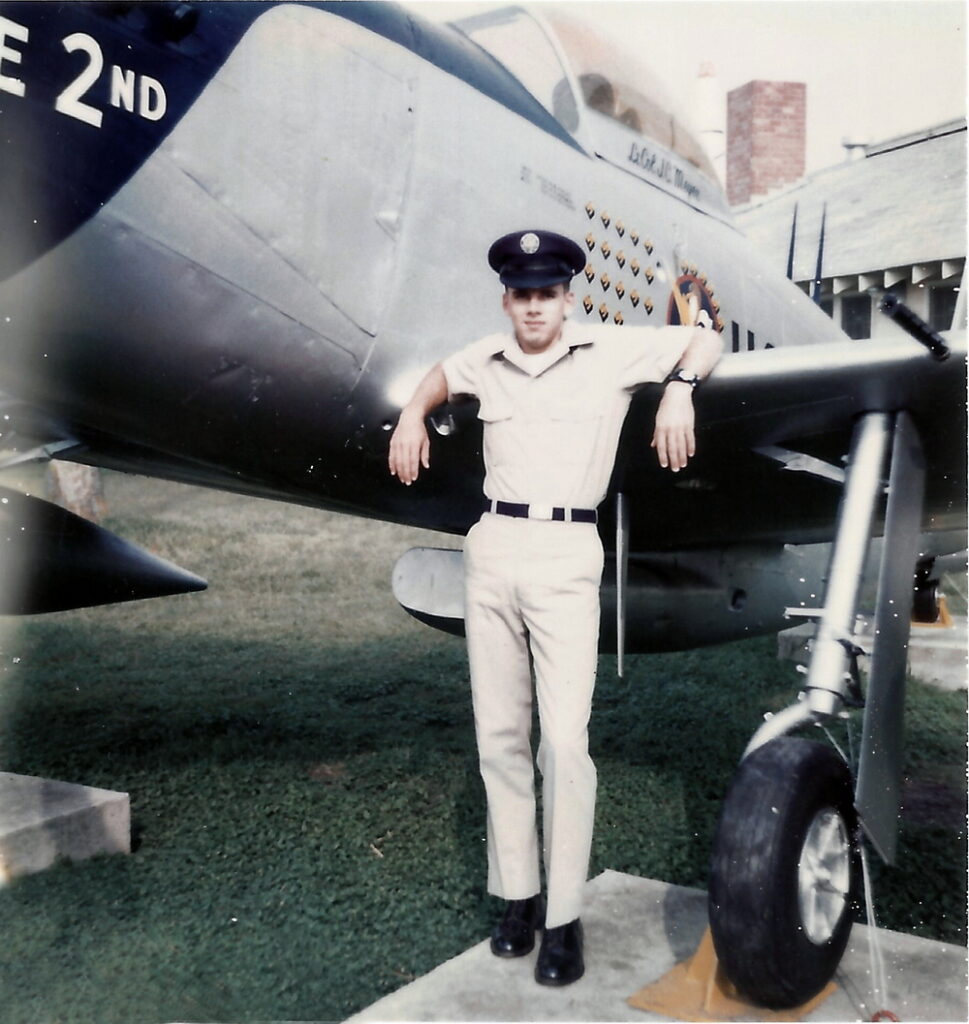
Well, I don’t know if the Air Force is anything like it was when I joined, but it is still one of the most significant military branches in the world. I would say do your best! Give it all you have to learn, adapt, and achieve whatever you set out in your mind to do. Learn the value of teamwork. It is never about one person but about a group of men and women working together to win. Each individual has their own responsibilities, talents, and moral compass to guide them to be greater than they ever thought possible in whatever mission they are given, but working together as a team is ultimately what will lead to success or failure. The service and sacrifice of all those who have gone on before us have given us the freedom to make the right choices and opened the doors to great advances in tactics and technology. We are still the greatest nation on the face of the earth, and we owe it to our grandkids to protect and defend our freedom today as our fathers did yesterday!
In what ways has togetherweserved.com helped you remember your military service and the friends you served with.
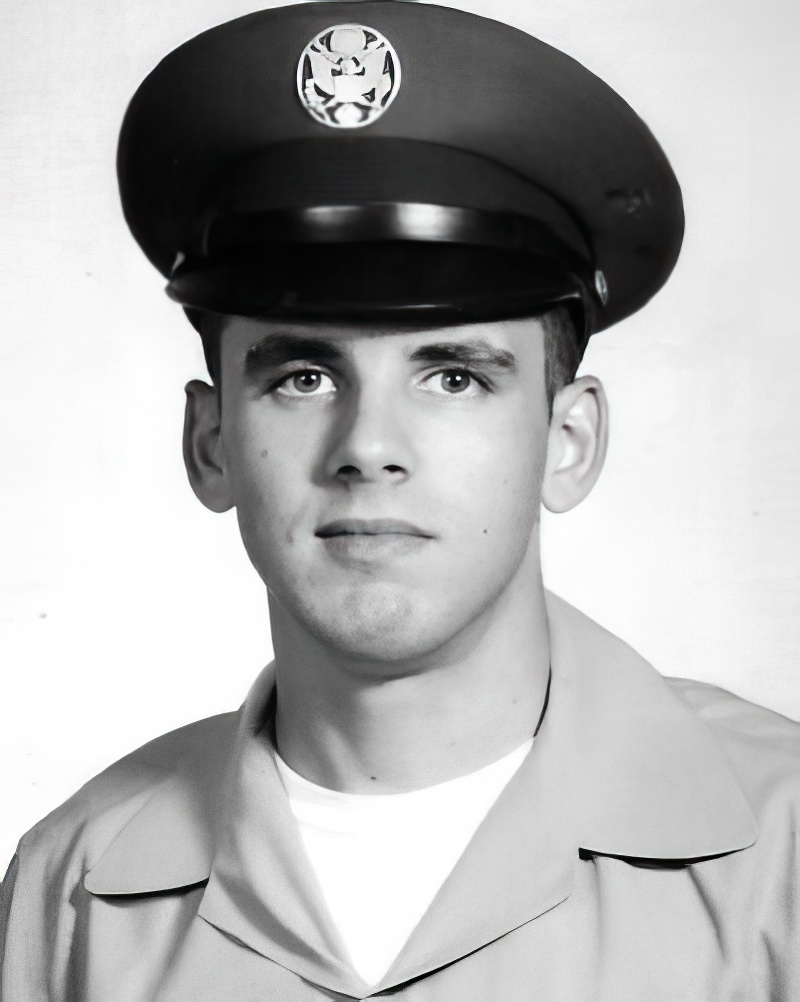
I have been a member of TogetherWeServed for quite some time and would regularly receive emails telling me I needed to complete the Reflections of My Service. Still, I kept putting it off because I was too busy. But for some reason, this past Veterans Day made me realize that it was too important for me to wait any longer if I was going to leave a legacy for my grandkids about my military service; now was the time. I just recently turned 70 years old (I went skydiving to celebrate this milestone), and my memory is not getting any better; it’s not great now, so while I am able, I wanted to write down in my own words just what serving in the Air Force had meant to me. Why I joined, the experiences, the people I met, and the things I accomplished are part of who I am and will always be an important part of my life. I am very grateful that TogetherWeServed has given me and other Veterans a platform to do just that so that, hopefully, we can pass on to the next generation the importance of having a strong military to defend our nation. God Bless the USA!
PRESERVE YOUR OWN SERVICE MEMORIES!
Boot Camp, Units, Combat Operations
Join Togetherweserved.com to Create a Legacy of Your Service
U.S. Marine Corps, U.S. Navy, U.S. Air Force, U.S. Army, U.S. Coast Guard
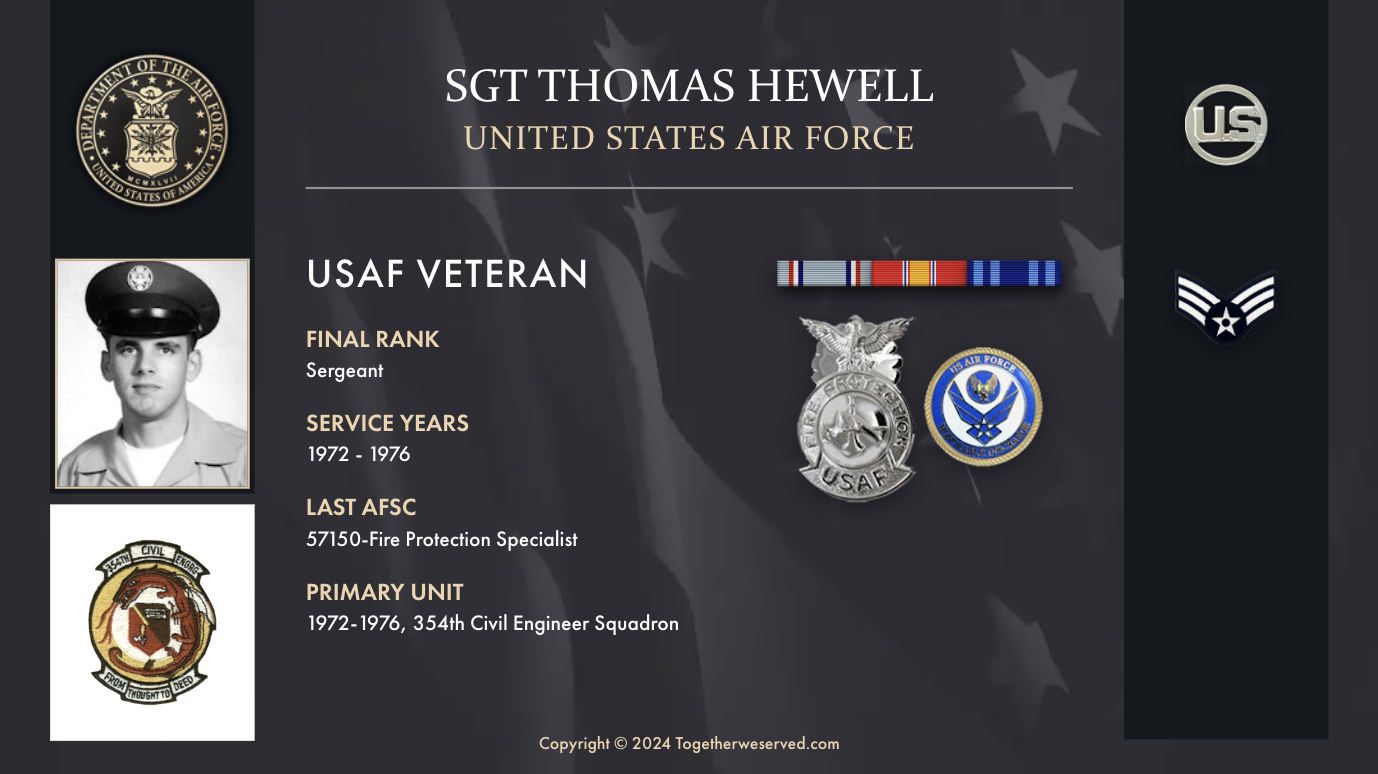
0 Comments